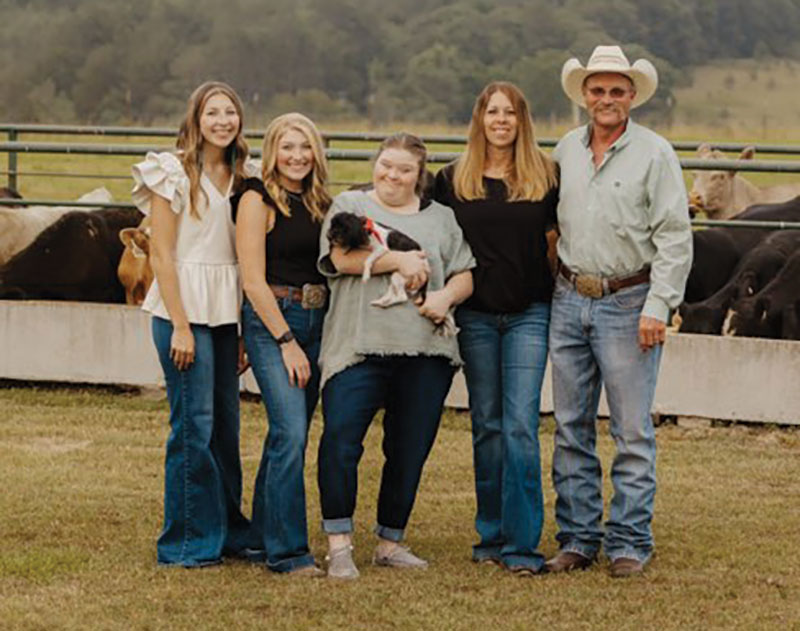
The McJunkin family work together to manage Bar MC Ranch
DENNARD, ARK. – The saying “the only constant is change” could not be more true than in the ranching and farming industries. Everything from corn futures to weather can change an entire year’s profit margin.
For smaller ranches, such as the feeder calves operation Bar MC Ranch in Dennard, Ark., even the slightest variance can make a huge difference. Owners Adam and Darla McJunkin said that while one of the biggest changes in their operations happened more than a decade ago, they see smaller changes with each passing year.
“It changes yearly,” Adam said. “Each year that we go to the sales we either push to get (a larger number of calves) or we wait. Every year we buy what gets us the best bang for our buck.”
Darla explained that they have to factor in many variables when choosing which calves and how many to purchase at each sale. Feed costs, the futures market, and the availability of animals are just some of the possible variables they look at each time.
“We know that some years we won’t make as much so we won’t pay as much (at sales) We will also go to several sales,” she said. “Sometimes we go to the sales and know we won’t be getting 30 head today. With our herd only being 140 to 150 head, we can’t afford to lose any.”
This is also why the family is so careful about how they doctor and feed their herd.
“We are very particular about what we buy and how we doctor them,” Darla said. “We make sure that they are getting everything they need.”
They grow enough hay for their own herd and sometimes have some left for family and friends. They mostly feed with a grain mixture, grass, and supplements. Adam explained that the calves are funneled back to the corral to eat all their meals, both in the morning and at night.
“They have to come back to eat at the corral. Everything is at the corral,” he said, adding that they do sometimes administer medicine using a dart gun while the sick calf is out in a field grazing.
The family has not always operated a feeder-calf-only operation. That was the big change that happened in 2012 when the family went from a cow/calf ranch to solely dealing with feeder calves.
That year, Arkansas experienced a long, historic drought, and it was monumentally difficult to grow hay and keep the herd well-fed and healthy in the heat. According to the National Weather Service, “it was a bad combination of very little rain and warmer than normal temperatures from April through July. During this four-month period, six to twelve-inch rainfall deficits were common (30 to 60 percent of normal rainfall). It was the driest April through July on record (up to that point).”
“We sold all our cows and have been doing (feeder calves) ever since,” Adam said. “The biggest transition was to learn how to doctor and care for the unweaned calves.”
Darla added that “with feeder calves, it’s a daily chore (to feed the herd). You are feeding them twice a day.”
The added chores are further complicated in that both Adam and Darla are both full-time employed, Adam at the Petit Jean Electric Cooperative and Darla at First Service Bank.
“We both have day jobs, Darla said. “He’s been at the Coop 30 years, and I’ve been at the bank 25 years.”
The couple’s three daughters, who range from 19 to almost 25, help in various capacities when they can. It’s all hands on deck during hay season, however.
“They help us rake it up and get it put up in the barn,” Darla said.
The McJunkins not only manage their 90-acre ranch, they also help out at Darla’s parents’ 160 acres nearby. Her dad also helps them, she said.
Both Darla and Adam grew up around animals with Adam’s family having a small farm where they grew animals for their own consumption and him working on other farms to help with cattle, and Darla’s family having a cow/calf operation.
“I was around it my whole life,” she said. “You learn by being around it.”
The McJunkins family was honored in 2023 with being named Van Buren County and North Central District Farm Family of the Year.
“It was a really cool honor,” Darla said, adding that they enjoyed being able to meet farmers and ranchers of all types from across the state.
“It takes all different types that come together to make things work,” she said. “We couldn’t do what we do without the cow/calf and grain farmers. It takes all farmers, ranchers, and the feed lots. They all play a hand in it.”
Both Adam and Darla agreed that they would like to grow the farm and that they are “always looking for land” to purchase. Working leased land has proven to cut too much into their family time in the past, they said.
“We always wanted it to be a family thing that we can do together,” Darla concluded.






